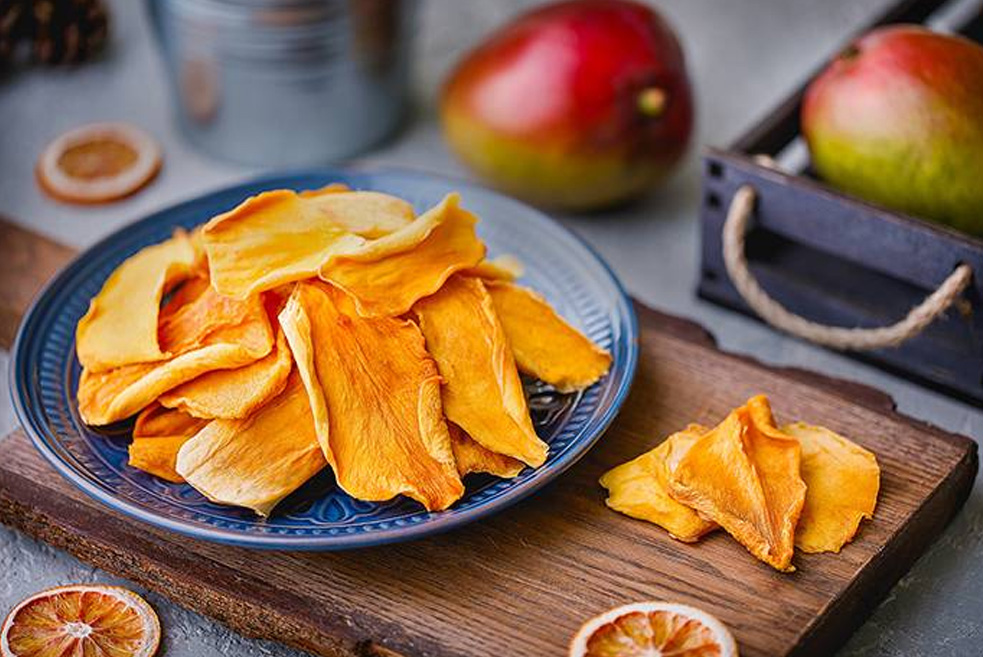Why Dried Mango is a Smart Investment for Retailers and Wholesalers
The UK snack industry is evolving, with a major shift towards healthier, natural alternatives. More consumers are moving away from high-sugar, processed snacks and turning to wholesome, minimally processed foods. This growing trend presents a lucrative opportunity for retailers, wholesalers, and food manufacturers to expand their product offerings and increase revenue.
Dried mango is emerging as one of the most profitable and versatile products in the health snack sector. With its naturally sweet flavour, high nutritional value, and long shelf life, dried mango is a low-risk, high-margin product that meets consumer demands for both health and convenience.
Why Consumers Are Choosing Dried Mango Over Traditional Snacks
- 100% Natural Sweetness – Unlike processed sweets, dried mango contains no artificial additives or refined sugar.
- Nutrient-Rich Superfood – Packed with vitamin C, beta-carotene, and fibre, supporting immune function and digestion.
- Dietary-Friendly – Dried mango is vegan, gluten-free, and dairy-free, making it suitable for a wide range of customers.
- Sustainable & Ethical Sourcing – Many dried mango products are sourced from smallholder farms in Kenya, supporting fair trade and sustainable farming practices.
- Convenient and Long-Lasting – With a 12-month shelf life, dried mango offers low waste, high profitability, and easy stock management.
How Dried Mango Stands Out in the Market
| Product | Wholesale Cost (per 100g) | Retail Price (per 100g) | Profit Margin | Shelf Life |
| Dried Mango | £0.80 – £1.20 | £2.50 – £3.50 | 30-40% | 12 months |
| Chocolate Bars | £0.50 – £0.80 | £1.20 – £1.50 | 15-25% | 6 months |
| Crisps | £0.40 – £0.70 | £1.00 – £1.30 | 10-20% | 3-6 months |
Dried mango is a premium product that commands higher retail prices, allowing for greater profit margins and stronger customer loyalty.
The Growing Demand for Dried Mango in the UK Market
According to Statista UK (2024):
- The UK dried fruit market grew by 11% in the past year, with dried mango leading the category.
- Over 60% of UK consumers are reducing sugar intake, making dried mango a preferred alternative to high-sugar snacks.
- 35% of health-conscious shoppers actively seek out minimally processed, naturally sweet snacks.
- Sustainability is influencing purchasing decisions, with more consumers choosing brands that support fair trade and ethical sourcing.
With the UK snack industry expected to grow by £1 billion by 2026 (Mintel, 2024), businesses that invest in natural, better-for-you snacks like dried mango will secure a competitive edge.
How Retailers Can Profit from Selling Dried Mango
1. Stronger Consumer Demand & Increased Sales
Retailers that stock dried mango will see higher purchase rates from health-conscious consumers, including:
- Busy professionals looking for an easy, on-the-go energy boost.
- Fitness enthusiasts seeking a natural source of vitamins and minerals.
- Parents looking for a healthier snack for children to replace sweets and processed snacks.
- Sustainable shoppers who choose ethically sourced, plastic-free packaging options.
2. Higher Profit Margins & Premium Pricing
Unlike commodity-based snacks such as crisps, dried mango is a premium product that allows for stronger markups.
- Smaller pack sizes still command a higher price per gram compared to other snack products.
- Premium branding and sustainable packaging increase perceived value.
- Healthy snack sections in stores drive impulse buys and repeat purchases.
3. Long Shelf Life = Less Waste & Lower Stock Costs
Stocking dried mango reduces inventory loss and increases stock control:
- 12-month shelf life = reduced waste compared to fresh fruit or perishable snacks.
- Less pressure to sell quickly, making it an ideal bulk buy product.
- Minimal storage requirements, reducing refrigeration or temperature control costs.

